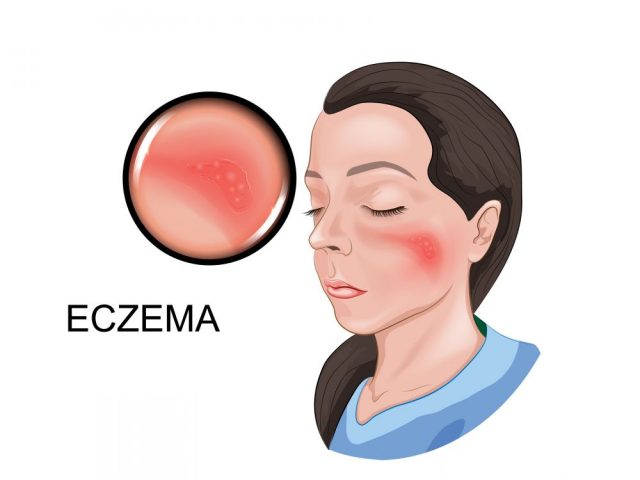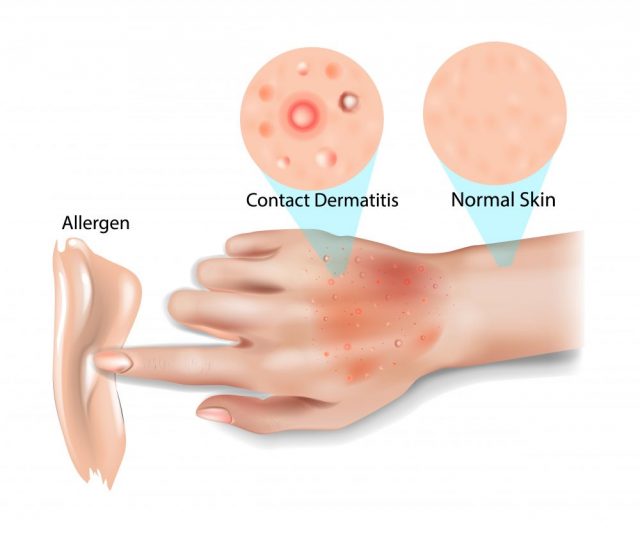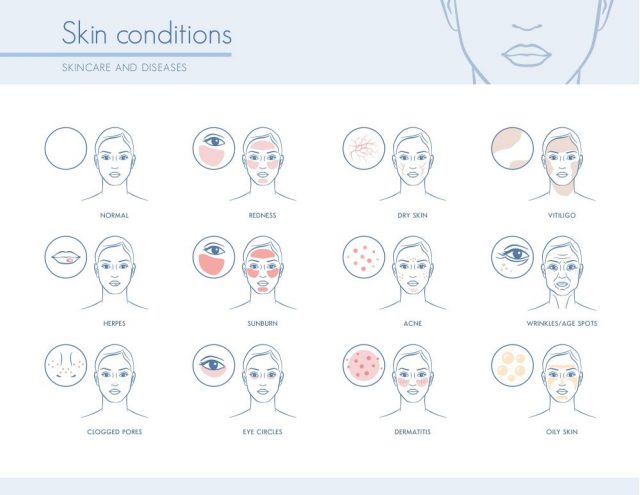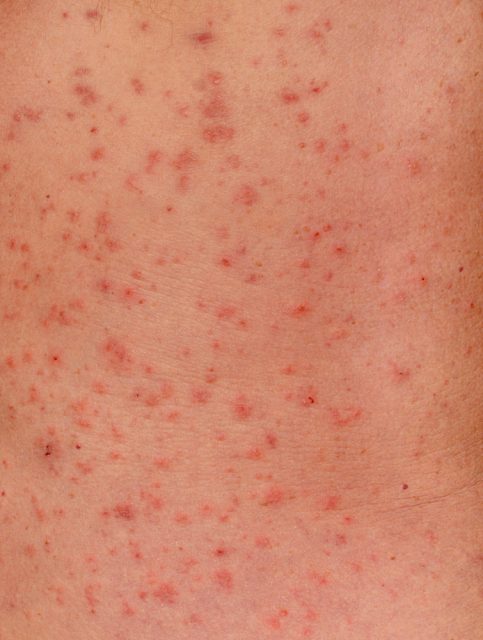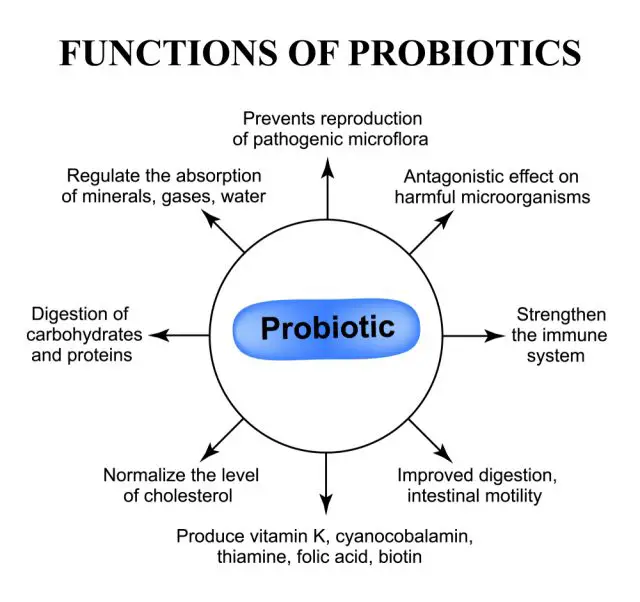Eczema Around the Eyes
Introduction
The technical term for eczema around eyes is eyelid dermatitis. This is a type of skin condition that causes flare-ups of itching or burning skin. These flare-ups may or may not include many other symptoms, but burning and itching is the first sign that a flare-up is about to take place. Symptoms for eyelid dermatitis are not always present. Symptoms come and go over time. A flare-up refers to obvious moments when the symptoms are present and bothersome.
It’s important to note that eczema around eyes is not contagious. You cannot develop this condition by coming into contact with someone who has it. Similar to other forms of eczema. However, it can be passed down through parents, so it’s genetically contagious.
Eye contact dermatitis is categorized by an inflammatory reaction to a trigger substance. Triggers fit into two categories: Irritant and Allergic.
Irritant Contact Dermatitis
This type of eczema around eyes is caused by an external irritant. This means it is not a result of antibodies or blood cells. It’s simply a reaction of the skin cells to an influence that is bothersome. This influence can be applied to the affected area, such as eye cream. This can also refer to a transferred influence, such as touching the affected area directly with an irritating substance. This type of eczema around eyes is more common with individuals who have sensitive skin. Irritants will vary from individual to individual, but below is a short list:
- Hand soap
- Laundry detergent
- Shampoo or conditioner
- Acids
- Chemicals (such as chlorine or new materials that cause off-gassing)
- Drying agents
- Cosmetics (mascara, concealer, eye shadow, etc)
- Sunscreen
- Dust
An irritation may also be caused by a foreign substance in the eye, an insect bite, or any type of physical trauma. Physical trauma to the sensitive skin around the eye can include rubbing or scratching the eye repeatedly. Irritation can also be caused by extreme temperature changes and humidity levels.
Atopic (Allergic) Contact Dermatitis
This type of eczema around eyes is caused by a reaction within the immune system. It is not an immediate reaction as it involves delayed-type hypersensitivity reaction and immune memory cells. The reaction can occur several days after coming into contact with the allergen. Unlike irritant contact dermatitis, which tends to happen to sensitive skin, allergic contact dermatitis can happen to anyone. It only takes exposure to an allergen.
Many people don’t even realize they are allergic to something at first, so it becomes hard to narrow down the possibilities. Still, here is a brief list:
- Cosmetics
- Cleansers
- Anything scented
- Adhesives (fake eyelashes)
- Nickel exposure (jewelry, eyelash curlers, tweezers)
- Food items
- Certain medications
- Certain materials (plastic, latex, rubber)
- Antiseptics (eye drops)
- Contact lens solution
- Animal fur
- Dust particles
- Pollen from plants
Eczema Around Eyes Causes
Aside from the triggers listed above (allergic reaction, irritant), there is no real cause for eczema. There have been many studies done to narrow down the options, but there are inconclusive. The best guess on the cause of eczema around eyes is that it’s simply a reaction from the immune system. In the instance of an allergy or foreign irritant, the immune system perceives a threat to the system. It has an overactive response and the result is eczema around eyes.
It is known that eczema can be passed through genetics, meaning there can be a previous exposure. Along with genetics, there are some risk factors that make it more likely to have eczema around eyes:
- Children
- Immune-compromised individuals
- Excessive stress
- Smoking
- Drinking too much
- Excessive caffeine consumption
- Dried out skin
- Family history of allergies
- Defects in skin thickness/health
Surveys done in the United States suggest that eczema affects 10% to 20% of all infants. The same studies suggest eczema only affects 3% of adults. These statistics show that eczema around eyes largely affects babies. Largely, it appears that the symptoms of eczema are gone by the age of 10. Only some individuals continue to experience flare-ups throughout adolescence and adulthood. Of course, there are lifestyle changes that can reduce the likelihood of flare-ups and natural remedies to reduce the severity of them.
Eczema Around Eyes Symptoms
For the most part, it’s fairly obvious when an eczema flare-up is occurring, especially eczema around eyes. Of course, there are no rules for flare-ups. The condition may affect one eye. It may affect both eyes. It may affect the surrounding area too. The flare-up can be mild or severe or anywhere in between. The symptoms that occur depend on the cause of the flare-up. Here is generalized list of symptoms:
- Itching
- Stinging
- Burning
- Dryness
- Crusting
- Flaking
- Swelling
- Leaking from eyes
- Red skin
- Red patches on skin
An eczema flare-up can be mild, only showing symptoms of dryness and itching. In more severe cases, eczema flare-ups can demonstrate any of the symptoms shown above. In addition, severe cases of eczema around eyes may include the eyes swelling complete shut.
This is a condition called lichenification that is a result of the eyelids (inside and out) thickening. This may cause blurred vision or an inability to see. Generally, this is not a cause for concern. However, this can also can lead to an extremely rare condition called atopic keratoconjunctivitis, which can cause blindness. It is important to see your doctor and rule that possibility out.
Eczema may also cause rashes on the skin. In some cases of eczema, the rash begins to spread to other areas. It’s not uncommon to see eczema around eyes and nose or eczema around eyes and mouth. If you are prone to rub or irritate the eczema further, these developments are common. Especially if the flare-up is a result of dry skin or an irritant. It is a little more uncommon to see eczema around eyes and ears. However, it’s still possible. The rash can spread almost anywhere, depending on what caused the flare-up. Eczema around the ear may be a hint as to the cause of the flare-up. Look into the types of hair products you’ve used recently.
Eczema around eyes may also result in post-inflammatory pigmentation. This means a more common appearance of dark circles around the eyes. This is not a medical concern, but it can be a bothersome aesthetic. Make sure you get plenty of rest and stay hydrated to visibility of these dark circles.
Reduction & Prevention
It’s not easy to prevent most conditions, but there are elements that can help with eczema. This includes lifestyle changes, dietary changes, environmental changes and general awareness. Below is a combined list of the best suggestions to prevent eczema around eyes:
- Avoid rubbing, scratching or otherwise irritating eye & surrounding area
- Wash out your eyes and eyelids with plain water
- Use a clean face cloth with warm water to remove any foreign substance from the eye
- When cleaning your eye, gently press, do not rub
- Only touch your eyes if you have clean (and rinsed) hands
- Only use cosmetics designed for sensitive skin (or choose all-natural options)
- Avoid contact with any known (or suspected) allergens
- Avoid contact with scratchy or irritating materials
- Wear protective gear over your eyes if there is a chance of contamination (snow, rain, sawdust, sand, gravel, etc)
- Try and avoid sudden or drastic changes in temperature as they can easily dry out your skin
- Try and avoid showering or bathing too frequently as it also dries out your skin
- Ensure your skin is always well hydrated (via a natural moisturizer, like coconut oil)
- Add essential fatty acids into your diet to boost your skin health
- Take vitamin supplements to boost your immune system (C, D, E) and reduce the intensity of flare-ups
- Add probiotics to your diet
- Consider purchasing a humidifier if your environment is too dry
Eczema Around Eyes Treatment
There is no treatment to complete eliminate symptoms, however, your doctor can prescribe something to help manage them. The type of prescription you’re given will depend on the symptoms and the cause of your eczema around eyes. Treatment may be as easy as discontinuing the use of a product that is causing the issues. It may be as easy as switching up your diet. There are many things that contribute and it may become important to rule out the possibilities.
There is no test to diagnose eczema around eyes. Initially, your doctor will diagnosis eczema simply through observing and asking about the symptoms. If the doctor believes this is caused by an irritant, you’ll likely be given an eczema around eyes cream. This cream is a 1% topical corticosteroid to reduce the inflammation. This is largely for minor cases that will go away. If your case is more severe, your doctor may recommended an oral corticosteroid.
If irritants are not the cause of eczema around eyes, an allergy test will need to be performed. This may include a patch test, intradermal testing, a skin prick test or even a radioallergosorbent blood test.
Additional treatment options for a mild case of eczema around eyes include:
- Antibiotics
- Moisturizers (prescribed)
- Moisturizers (store-bought, avoid any fragrances)
- Eye drops
There are instances that the symptoms are more severe or the generally treatment options don’t work. In these cases, the doctor may have to get more creative. This may include phototherapy, a process that uses ultraviolet lighting to help find a cause. This isn’t recommended for anyone with sensitive skin, as they tend to react poorly to the light.
Topical immunomodulators (such as elidel or protopic) may be used in the most severe cases. These treatments are to be used with severe caution. Early testing suggests there is a possible link between these immunomodulators and cancer. It is never to be used in children under the age of 2 years. It is not intended to be used for prolonged periods of time. It is a temporary solution for critical conditions. The package for these treatments still has the black box label by the FDA.
Eczema Around Eyes Natural Remedy
If an irritant is the cause, a natural remedy may work just as well as a prescribed treatment. Again, natural remedies are not a solution. There are only meant to reduces symptoms. There is no long-term treatment for eczema, but many of the home remedies can be used to prevent flare-ups as well. Here are a few of the safest home remedies available for eczema around eyes:
- Hold a cold compress to your affected eye(s)
- Soak a hand towel in warm water, hold it over your affected eye(s)
- Apply a small amount of aloe vera gel to the affected area (external use only)
- Apply a small amount of coconut oil to the affected area
- Apply a small amount of witch hazel to the affected area (external use only)
- Combine raw oatmeal and a bit of natural honey to create a homemade salve for eczema around eyes
- Place slices of cucumber over your eyes to help moisturize
Although it is generally advisable to speak to your doctor before attempting any home remedy, these ones are fairly safe. However, some ingredients may cause an allergic reaction in specific individuals. If you’re unsure about a possible allergy, give yourself a patch test. Spread the ingredient on your arm and leave it sit for a few hours. You’ll want to wait a day or two, as many allergic reactions are delayed. If there is no reaction after that time frame, you can use the product on your eyes.


